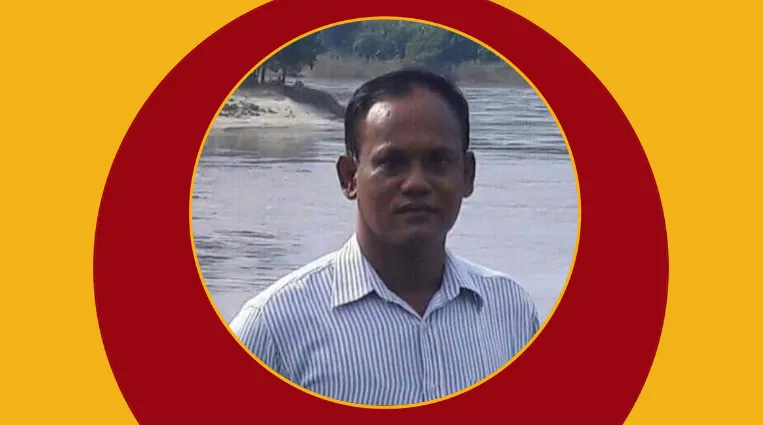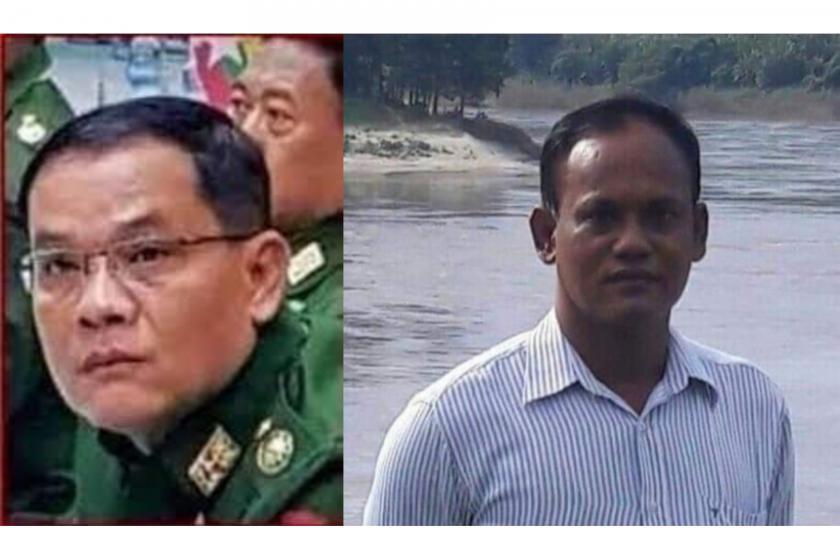Younger brother of Myanmar’s police chief murdered in regime custody
26 May 2021

Police chief Than Hlaing once reportedly threatened to cut off his brother’s head because he took up arms against the Myanmar military

Police chief Than Hlaing (left) and his brother Soe Moe Hlaing became bitter enemies in the late 1980s
By Myanmar Now
They were two brothers with radically different ideologies who became bitter enemies during the 1988 democratic uprising–even once meeting on the battlefield.
One joined the army and rose through the ranks to become a senior member of the military establishment. The other joined mass protests and later travelled to Myanmar’s jungle-covered borderlands to take up arms against the junta.
Now, with the country once again in the grips of a revolution, their rivalry is over.
Soe Moe Hlaing, the veteran democracy activist, was murdered in regime custody on Monday evening after soldiers grabbed him from his village in Bago Region. The 53-year-old was the 827th person to be murdered at the hands of the new regime, according to one tally.
His death comes almost four months after his older brother, Than Hlaing, was appointed Myanmar’s chief of police, making him one of the key figures overseeing the recent campaign of terror against Myanmar’s defiant population.
A lieutenant general, Than Hlaing was also appointed deputy home affairs minister on February 2, the day after military chief Min Aung Hlaing toppled Aung San Suu Kyi’s elected government.
Both the EU and the US have blacklisted Than Hlaing for his role overseeing the crackdown, during which more than 5,400 people have been arrested. He previously served as the head of Eastern Central Command and North Western Command.
Soe Moe Hlaing, also known as Mae Gyi, was arrested in Zaung Tu village on Saturday along with eight others. It is unclear why they were detained.
His wife, Myat Muyar Win, told Myanmar Now that soldiers from the local 901st Artillery Operations Command took her husband, and that he was reportedly beaten with the butt of a gun during the arrest.
Two days later, she received a phone call from a regime official telling her that he was dead. “They said he died of some disease. But my husband was healthy and did not have any diseases,” she said.
The family were not allowed to take Soe Moe Hlaing’s body home and were told it would be cremated by soldiers at a military cemetery in Mingaladon on Tuesday. Than Hlaing reportedly came to the cemetery to look at the body before the cremation, said Myat Muyar Win.
If true, it is the closest contact he has had with Soe Moe Hlaing in many years. “The brothers had no communication with each other,” said Myat Muyar Win. In a separate interview with the BBC’s Burmese service, she said: “During our 15 years of marriage, I had never seen them talk. No contact at all.”
The brothers came from a family of 11 siblings. After taking part in the 1988 uprising, Soe Moe Hlaing joined the All Burma Students’ Democratic Front (ABSDF), a revolutionary armed group in which he served as a battalion commander.
The move infuriated his army officer brother, said Tun Tun Kyaw Oo, who spent time in Insein Prison with Soe Moe Hlaing.
“Than Hlaing sent Mae Gyi letters challenging him to a fight,” he told Myanmar Now. “He said he would kill his brother and cut off his head because he joined the armed group.”
Than Hlaing got his fight. He was sent to the region where Soe Moe Hlaing was based to take on the ABSDF. “In 1989 he exchanged shots with his brother on a Karen battlefield,” Tun Tun Kyaw Oo said.
The next year, Soe Moe Hlaing left the ABSDF–it’s unclear why–and went to Yangon.
Then in December 1991 he was arrested and sentenced to 13 years in prison for supporting the ABSDF’s underground activities, and for taking part in a campaign to demand the release of Aung San Suu Kyi, who was then in the middle of her first stint under house arrest.
He was released in 2001, and later threw himself into volunteer community work, helping people in a number of villages along the Bago River. “He did all the local development work such as teaching, digging wells and helping locals get electricity,” Myat Muyar Win said.
Unlike in 1988, he was not on the frontlines of the current movement to overthrow the regime, but he offered encouragement and assistance to those who were, she said.
Soe Moe Hlaing left behind five children; the youngest is a year and half old.
Original Post: Myanmar Now
Announcements
21 May 2025
Open letter: Malaysia must lead ASEAN with principle, not hypocrisy, to address the Myanmar crisis

Progressive Voice is a participatory rights-based policy research and advocacy organization rooted in civil society, that maintains strong networks and relationships with grassroots organizations and community-based organizations throughout Myanmar. It acts as a bridge to the international community and international policymakers by amplifying voices from the ground, and advocating for a rights-based policy narrative.